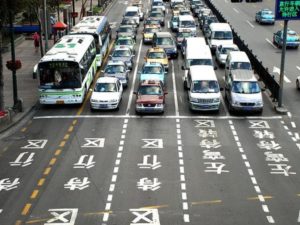The burning of fossil fuel is undoubtedly one of the lead causes of air pollution. When a petrol or diesel engine is operated, it burns to release greenhouse gases which find their way into the atmosphere and cause the depletion of the ozone layer. The depletion of the ozone layer – which serves as sun filter – allows harmful rays to reach the earth.

France and Britain had earlier announced plans to end the sale of petrol and diesel cars and China has signaled they would join in the end to diesel and petrol cars. China is the world’s biggest auto market by the number of vehicles and such a huge policy change will significantly affect the global industry.
There is no date set for the transition but Beijing is building pressure on automakers to hasten the development of electrics. China’s industry minister is already developing a timetable to end the production and sale of traditional fuel cars.
Britain and France made the announcement in July that by 2040, they would stop the sale of petrol and diesel automobiles as part of their effort to reduce carbon emissions and pollution which lead ultimately to global warming. It can be recalled that various countries made different pledges towards a cleaner environment during the Paris accord of 2015. Inasmuch as it may seem as if some countries have abandoned theirs, others are keen to meet their target on the reduction of emission.

Vice-minister of industry and information technology, Xin Guobin, while addressing a forum in the northern city of Tianjin broke the news saying a timetable is under development for the country. His remarks which were aired on CCTV state television was as follows,
“These measures will promote profound changes in the environment and give momentum to China’s auto industry development. Enterprises should strive to improve the level of energy saving for traditional cars, and vigorously develop new energy vehicles according to assessment requirements.”
Source: The Guardian
There is a growing call to put an end to combustion engine cars and the announcement by China may just deal the final blow considering the country’s influence in the automotive industry. Xin predicts turbulent time for the car manufacturers in the country but some of them have already taken up the challenge.
Volvo is set to unveil its first fully electric car in China by 2019. Ford is also aiming at marketing its first hybrid car by early next year. Ford is also making plans for seventy percent of all its cars that would be available in China by 2025 to have an electric option. General Motors Co., Nissan Motor Co., and Volkswagen AG have also made similar announcement.

In 2009, China toppled the United States to become the biggest car market in the world. They have also gone ahead to set an ambitious goal of reaching 7m annual New Energy Vehicles sales (NEV) by 2025. More than two hundred companies have already declared their interest to make NEVs in China, lured by subsidies, rapid sales and more flexible access to car registration for NEV buyers.
Beijing has shown serious concern about the rise in urban pollution (sometimes leading to a fog) and the nation’s over-dependence on imported oil. This is the motivation behind China’s push for new energy vehicles. Regarding the timeline for the transition to NEV, Xin said,
“The ministry has also started research and will make such a timeline with relevant departments.”
Source: Financial Times
Beijing has given directives to state-owned Chinese power companies to speed up the installation of charging stations to intensify the demand for electric cars.

The government of China is also making new policies on carbon trading to encourage the production of NEV as early as next year. The draft rules on local production of electric vehicles are already in circulation but yet to become a law. The new rule will require carmakers to manufacture a quota of NEV or buy carbon credits as compensation. There are indications that China would likely delay the implementation of production quotas for NEV to give global automakers more time to prepare.






